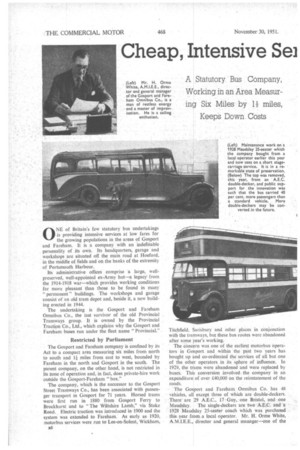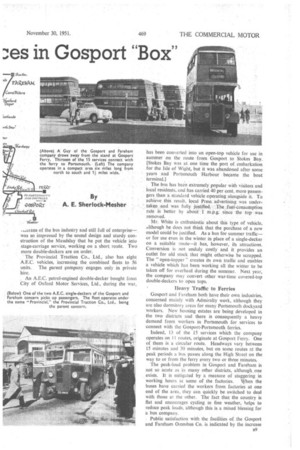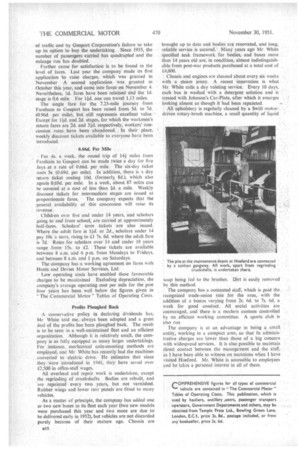Cheap, Intensive Se] :les in Gosport "Box"
Page 42

Page 43

Page 44

If you've noticed an error in this article please click here to report it so we can fix it.
A Statutory Bus Company, Working in an Area Measuring Six Miles by U miles, Keeps Down Costs
By A. E. Sherlock-Mesher
ONE of Britain's few statutory bus undertakings is providing intensive services at low fares for the growing populations in the areas of Gosport and Fareham. It is a company with an indefinable personality of its own. Its headquarters, garage and workshops arc situated off the main road at Hoeford, in the middle of fields and on the banks of the extremity of Portsmouth Harbour.
Its administrative offices comprise a large, wellpreserved, well-appointed ex-Army hut—a legacy from the 1914-1918 war—which provides working conditions far more pleasant than those to be found in many 4, permanent " buildings. The workshops and garage consist of an old tram depot and, beside it, a new building erected in 1944.
The undertaking is the Gosport and Fareham Omnibus Co., the last survivor of the old Provincial Tramways group. It is owned by the Provincial Traction Co., Ltd., which explains why the Gosport and Fareham buses run under the fleet name "Provincial."
Restricted by Parliament
The Gosport and Fareham company is confined by its Act to a compact area measuring six miles from north to south and 11 miles from east to west, bounded by Fareham in the north and Gosport in the south. The parent company, on the other hand, is not restricted in its zone of operation and, in fact, does private-hire work outside the Gosport-Fareham "box."
The company, which is the successor to the Gosport Street Tramways Co., has been associated with passenger transport in Gosport for 71 years. Horsed trams were first run in 1880 from Gosport Ferry to Brockhurst and to "The Wiltshire Lamb," via Stoke Road. Electric traction was introduced in 1900 and the system was extended to Fareham. As early as 1920, motorbus services were run to Lee-on-Solent, Wickham, B8
Titchfield, Salisbury and other places in conjunction with the tramways, but these bus routes were abandoned after some year's working.
The concern was one of the earliest motorbus operators in Gosport and within the past two years has bought up and co-ordinated the services of all but one of the other operators in its sphere of influence. In 1929, the trams were abandoned and were replaced by buses. This conversion involved the company in an expenditure of over £40,000 on the reinstatement of the roads.
The Gosport and Fareham Omnibus Co. has 48 vehicles, all except three of which are double-deckers. There are 29 A.E.C., 17 -Guy, one Bristol, and .one Maudslay, The single-deckers are two A,E:C, and a 198 Maudslay 25-seater coach which was purchased this year from ,a local operator. Mr. H. Orme White, A.M.I.E.E., director and general manager—one of the
....clans of the bus industry and still full of enterprise— was so_ impressed by the sound design and sturdy construction of the Maudslay that he put the vehicle into stage-carriage service, working on a short route. Two more double-deckers are on order.
The Provincial Traction Co., Ltd., also has eight A.E.C. vehicles, increasing the combined fleets to 56 units. The parent company engages only in private hire.
An A.E.C. petrol-engined double-decker bought from City of Oxford Motor Services, Ltd., during the war,
has been converted into an open-top vehicle for use in summer on the route from Gosport to Stokes Bay. [Stokes Bay was at one time the port of .embarkation for the Isle of Wight, but it was abandoned after some years and Portsmouth .Harbour became the boat terminal.] . The bus has been extremely popular with visitors and local residents, and has carried. 40 per cent. more passen, gers than a standard vehicle operating alongside it: To achieve this result, local Press, advertising was undertaken and was fully justified, .The.,-„fuel,consumption rate is better by about I m.p.g. since the -top was removed.
Mr. White is enthusiastic about this type of vehicle,. Athough he does not think that the purchase of a new model could be justified. As a bus for summer traffic-or for use even in the winter in place of a single-decker on a suitable route—it has, however, its attractions. Conversion is not unduly costly and it provides an outlet for old stock that might otherwise be scrapped. The " open-topper " creates its own traflic and enables a vehicle which has been working all the winter to be taken off for overhaul during the summer. Next year, the company may convert other war-time covered-top double-deckers to open tops.
Heavy Traffic to Ferries
Gosport and Fareham both have their own industries, concerned mainly with Admiralty work, although they are also dormitory areas for many Portsmouth dockyard workers. New housing estates are being developed in the two districts and there is consequently a heavy demand from workers in Portsmouth for services to connect with the Gosport-Portsmouth ferries.
Indeed, 13 of the 15 services which the company operates on 11 routes, originate at Gosport Ferry. One of them is a circular route. Headways vary between 15 minutes and 30 minutes, but on some routes at the peak periods a bus passes along the High Street on the way to or from the ferry every two or three minutes.
The peak-load problem in Gosport and Fareham is not so acute as in many other districts, although one exists. It is mitigated by a measure of staggering in working hours at some of the factories. When the buses have carried the workers from factories at one end of the area, they can quickly be switched to deal with those at the other. The fact that the country is flat and encourages cycling in fine weather, helps to reduce peak loads, although this is a mixed blessing for a bus company.
Public satisfaction with the facilities of the Gosp.ort and Fareham Omnibus Co. is indicated by the increase B9 of traffic and by Gosport Corporation's failure to take up its option to buy the undertaking. Since 1935, the number of passengers carried has quadrupled and the mileage run has doubled.
Further cause for satisfaction is to be found in the level of tares. Last year the company made its first application to raise charges, which was granted in -November A second application was granted in October this year, and came into force on November 4. Nevertheless, id. fares have been retained and the Id. stage is 0.6 mile. For lid. one can travel 1.13 miles.
The single fare for the 7.23-Mile journey from Farehain to Gosport has been raised from 5d. to id. (0.96d. per mile), but still represents excellent value. Except for I d. and 2d. stages, for which the workmen's return fares are 2d. and Md. respectively, workers' concession rates have been abandoned. In their place. weekly discount tickets available to everyone have been introduced.
0.66d. Per Mile
For 4s. a week, the round trip of 141 miles from Fareham to Gosport can be made twice a day for five Jays at a rate of 0.66d. per mile. The .six-day ticket zosts 5s. (0.69d. per mile), In addition,, there is a day return ticket costing 10d. (formerly. 8d.), which also equals 0.69d. per mile. In a week, about 87 miles can be covered at a cost of less than id. a mile. Weekly diSCOUllt tickets for intermediate stages are issued at
proportionate fares. The company expects that the general availability of •this concession will raise its revenue.
Children over five and under 14 years, and scholars going to and from school, are carried at approximately half-fares. Scholars' term tickets are also issued. Where the adult fare is Id. or 2d., scholars under 14 pay 10s. a term, rising to fl 7s. 6d. where the adult fare is 7d. Rates for scholars over 14 and under 18 years range from 15s. to £2. These tickets are available between 8 an), and 6 p m. from Mondays to Fridays, and between 8 a.m. and I p.m. on Saturdays.
The company has a working agreement on fares with Hants and Dorset Motor Services, Ltd.
Low operating costs have enabled these favourable charges to be maintained Excluding depreciation, the company's average operating cost per mile for the pat four years has been well below the figures given in "The Commercial Motor" Tables of Operating Costs.
Profits Ploughed Back A conservative policy in declaring dividends has, Mr White told me, always been adopted and a great deal of the profits has been ploughed back. The resillt is to be seen in a well-maintained fleet and an efficient organization. Although it is relatively small, the company is as fully equipped as many larger undertakings. For instance, mechanical coin-counting methods arc employed, and Mr White has recently had the machines converted to electric drive. He estimates that since they were introduced in 1941, they have saved over 12,500 in office-staff wages.
All overhaul and repair work is undertaken, except the regrinding Of crankshafts. Bodies are rebuilt, and 'are repainted every two years, but not varnished. Robber wings and lower rear panels are fitted to many vehicles.
As a matter of principle, the company has added one or two neW buses to its fleet each year (two new models were purchased this year and two more are due to be delivered early in 1952), but vehicles are not discarded purely because of their mature age. Chassis are B10 brought up to date and bodies are renovated, and long, reliable service is secured. Many years ago Mr. White specified teak framework for bodies, and buses more than 14 years old are, in condition, almost indistinguishable from post-war products purchased at a total cost of £4,000.
Chassis and engines are cleaned about every six weeks with a steam jenny. A recent innovation is what Mr. White calls a day valeting service. Every 10 days, each bus is washed with a detergent solution and is treated with Johnson's Car-Plate, after which it emerges looking almost as though it had been repainted.
All upholstery is regularly cleaned by a Swift motordriven rotary-brush machine, a small quantity of liquid soap being fed to the brushes. Dirt is easily removed by this method.
The company has a contented staff, which is paid the recognized trade-union rate for the area, with the • addition of a bonus varying from 2s. 6d. to 7s. 6d, a week for good conduct. All social activities are encouraged, and there is a modern canteen controlled by an efficient working committee. A sports club is also run
The company is at an advantage in being a small entity, working in a compact area, so that its administrative charges are. lower than those of a big 'concern with widespread services. It is also possible to maintain direct contact between the management and the staff, as I have been able to witness on occasions when 1 have visited Hoeford. Mr. White is accessible to employees and he takes a personal interest in all of them.




















































































